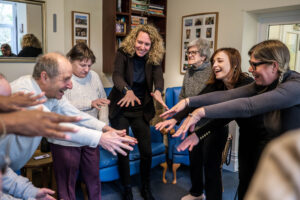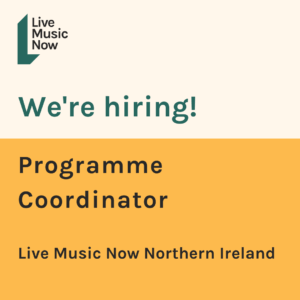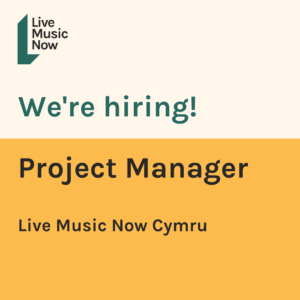Joel Garthwaite, LMN Aumn (Lunar Sax 2008 – 2011)
in conversation with Alumni co-ordinator Jo Harris

Joel Garthwaite joined LMN as a saxophonist with Lunar Sax. Since leaving the scheme three years ago he performs on a freelance basis for chamber ensembles, orchestras and sessions. In addition he is the Director of Music in Offices, the UK's leading provider of workplace choirs and tuition and founder of agency, Bright Ivy.
What makes you get out of bed in the morning?
The idea of doing something creative that makes a difference. Whether it's working with other artists or performing, I love the variety of my career.
What makes you lose sleep at night?
Occasionally having so many different thoughts from different projects running through my head but generally I'm a pretty sound sleeper.
How did your experience on LMN impact your career choices?
LMN gave me experience that just wouldn't have been achievable anywhere else. The diverse nature of the work and the level of professionalism expected was just what I needed to make me see myself as a business. I always had an interest in business and LMN provided me with an opportunity to operate in a way where every performance was a platform to showcase my 'business' and connect with people. I suppose this has carried through into my current work.
I love your core idea of Bright Ivy; music without boundaries, genre free and genuinely collaborative. Why has no one done an agency like this before?
Everyone likes labels. Are you a PC or Mac? Do you vote Labour or Lib Dem? Do you like classical or jazz music?
I honestly believe there are elements of all genres of music that people would enjoy if they gave it a chance. 'Classical' music has influenced every style of music that has come since, including pop so I don't see there are as many boundaries as people make out there are. Contemporary composers like Nico Muhly are working with artists like Antony and the Johnson's and I think he adds something to that music that wouldn't have been possible without the collaboration.
With Bright Ivy we offer an environment for any artists, performing any genre of music to collaborate and innovate. It's these unexpected collaborations that produce the most exciting work. Why has no one done it before? Every new concept has to start at some point.
A recent study at King's College London has shown that recent graduates from music college feel ill equipped to deal with the challenges of self promotion. Where should they go for help?
I'm not surprised. I received very little, if any, business advice, during my time at Music College. I was given the skills needed to teach and perform on my instrument but I certainly wasn't given any advice or skills to allow me to operate in any other field other than that.
I've always been curious about business, and specifically why certain businesses are more publicly approved than others. John Lewis is more loved than Tesco for example.
I'm currently half way through doing an MBA, which has been a great experience. Even if a tiny, abbreviated portion of the information I've learnt from the course was passed on to me whilst at Music College that would have allowed me to make thoroughly thought through, informed decisions about my career decisions rather than just doing what everyone else was trying to do, become a performer.
Bright Ivy is trying to re-address this issue and give performers some guidance to allow them to see themselves as a business and tools to allow them to succeed in the long term. Of course I want to help artists use their passion and skills to be creative in the short term but I also want to make sure they can afford to live and retire with enough money live on too.
Tell us a bit about the idea behind Music In Offices. Is it led by political/social trends?
MIO was started back in 2007. It started when Tessa's (fellow MIO director) brother was working at a big London law firm and was finding it incredibly stressful. He had always played music and we thought having a break out of his busy schedule to come and continue his learning in his workplace could help the problem. 7 years on, we're working at over 35 clients in London with around 250 people per week having music lessons in their workplace and over 30 choirs rehearsing each week.
It wasn't started because of any trends, just as a potential idea to solve one person's work related problem. Obviously since then the Gareth Malone effect has swept the nation and we have consulted and provided conductors for the two Sing While you Work BBC series'.
Employee benefits and CPD are vitally important for staff and businesses are slowly starting to realise that not everyone wants to play sport or learn a language.
What personal attributes do you need to work in a corporate environment? How does it differ from your LMN venues?
I don't think it differs that much really. I think corporate employees actually enjoy having the usual hierarchy associated within their work ignored. Whether our teachers are teaching the security staff or CEO of a company they are treated with the same level of professionalism and standards. That's why workplace choirs are so good; they are a complete leveller for anyone taking part in them. LMN works on exactly the same principles, everyone is entitled to the same level of exposure to professional musicians, whether they are in a dementia ward or a special needs school.
In a practical sense, I tend to use more business-orientated terminology when speaking to corporate clients, as that's what they are used to. It's the same as if I was teaching a class of 4 year olds, I would adapt the language I used with them so I'm understandable and can communicate as effectively as possible.
I also dress a little more formally than I normally would on client visits. Companies often have an image to uphold and have guests visiting their premises regularly. If I, or any of our staff turned up in jeans and trainers to a law firm it wouldn't reflect on the nature of the work they do. At Channel 4 on the other hand a suit may also not be suitable.
What advice would you give to a musician on making a living?
I'll give you five points I think are really important and have stood me well over the years.
1. Work on projects you love. It's the only way to make sure you consistently give 100%. This level of dedication comes across when you're speaking about your work to others and is infectious.
2. Know what your final price is for a project and don't undersell yourself. People already have a devalued opinion of the music industry so charge what you're worth, after doing some market research to find out the going rate and positioning yourself in the market accordingly, obviously.
If people don't want to pay that amount then don't be afraid to turn down the work. I know it's scary and musicians are conditioned to think of every performance opportunity as a platform for more work but accepting work for less than you originally state furthers the devaluation of our art and yourself as a business.
3. Network as much as possible.
4. Have a high quality web presence.
5. Don't be afraid to seek help or ask questions.






